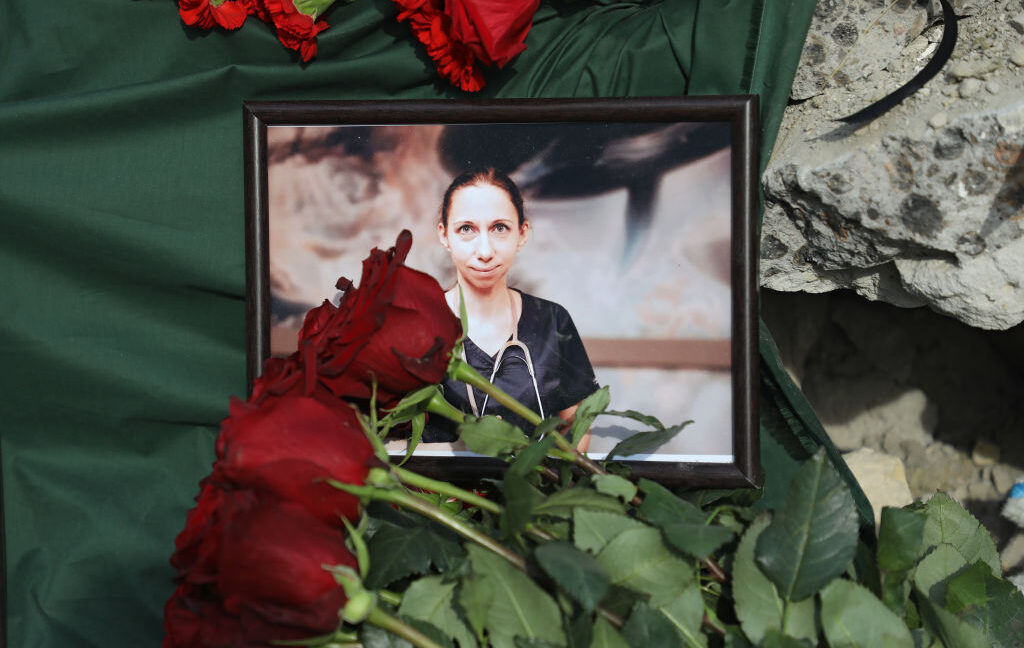So there’s this gorge. Nobody knows where it is exactly, because the shadowy paramilitary organization that oversees it uses cloaking technology to keep the place hidden from satellites, Google Earth, and world leaders alike, but an educated guess might put it somewhere in the wilds of Norway or the forests of northern Russia. Then again, the rumpled duvet of impenetrable fog that stretches from one side of this thing to the other feels like it’s not of our world at all.
The Gorge is monitored by two snipers on annual rotations, each stationed on opposite sides of the ravine. This arrangement stretches back to at least the Cold War, with one soldier representing the West, the other representing the East, and both strictly forbidden from communicating with each other. Their mutual job is to make sure that whatever is in the gorge never manages to get out. “The Gorge is the door to hell,” a sad-sack named Levi Kane (a gravelly and goateed Miles Teller) is told by his predecessor at the start of his year-long shift, “and we’re standing guard at the gate.” Ominous! If only the ultimate truth of the Gorge were even half as evocative as the metaphor that Zach Dean’s script uses to describe it, perhaps the movie that shares its name wouldn’t feel so destined to spend the rest of eternity in an afterlife more inescapable than hell itself: the abyssal bowels of a tech company’s streaming library.
Plot is often the cruelest fate that could ever befall a cool premise, and so it goes with Scott Derrickson’s “The Gorge,” a high-concept genre exercise whose shallow depths are all too eager to come to the surface. Needless to say, the film is at its best before they do — when the focus is less on the screeching mystery nightmare at the bottom of the ravine and more on the pair of hot but haunted singles hired to keep whatever’s down there from spilling over and reaching the rest of the world.
Levi is stationed in the western tower, and the loneliness of the assignment seems to suit the semi-retired marksman just fine. The specifics of his backstory are left to the imagination, but we sense that being a soldier is both the source of his demons, as well as his only method of keeping them bottled up (as the Gorge itself will make clear, some things are better destroyed than contained). Levi is the kind of guy who salutes everyone he meets, even though he’s been out of the service for several years. He’s the kind of guy so desperate for a reason to do anything that he doesn’t think twice when a transparently evil Sigourney Weaver — holed up in a shadowy government office that appears to overlook a futuristic neon hellscape of some kind — summons him to her lair for the shadiest mission of his life. Sure, Levi doesn’t know that everyone who serves at the Gorge is promptly executed on the flight home, but even that might not be a dealbreaker for him at this point.
Once known for his irrepressible charm, Teller approaches his latest role as if it were a feature-length audition for a Paul Schrader movie, and — if nothing else — his performance succeeds on that score. Such warrior-poet anti-charisma feels out of place in a dopey movie that proves more interested in CGI monsters than its hero’s mottled humanity (Levi’s constant allusions to T.S. Eliot are labored enough to feel like comic relief), but it makes for a nice contrast to the more fun-loving sniper stationed on the other side of the Gorge: a Lithuanian la femme Nikita played by a roguish and delightful Anya Taylor-Joy, bopping along to the beats of this story with enough breezy confidence to make you forget what lies below. Drasa has demons of her own, of course, but they don’t stop her from weathering the winter in a pair of ripped lycra pants or from writing flirtatious messages to the shy guy across the gap (à la Zack Snyder’s “Dawn of the Dead” remake). It’s just like Godard once said: All you need to make a movie is a boy, a girl, and a gorge.
The long-distance courtship between these two soldiers of fortune doesn’t exactly light the screen on fire, but it’s always fun to watch Taylor-Joy play chess, and not even a wet blanket like Levi can resist the spectacle of Drasa getting drunk on her own as she dances to The Yeah Yeah Yeahs. It’s no surprise that these lost souls engineer a way to be together, and fast. What’s surprising is that doing so deprives “The Gorge” of its only real intrigue, as Derrickson is even faster to dismantle our curiosity about what Levi and Drasa are doing there in the first place.
The movie is only 35 minutes old when it gives us a clean look at the creatures trying to climb their way to the surface (spoiler alert: picture a palpably digital humanoid tree ghoul whose branch-like appendages suggest “I Am Legend” by way of “Annihilation”), and one clean look is all it takes to lose interest in where they came from. Alas, “The Gorge” doesn’t see things quite the same way. On the contrary, the movie fatally overestimates the appeal of its monsters and their habitat, and the fun comes to a screeching halt when our characters plunge into the Gorge itself and begin to learn the truth about what their governments have been trying to hide.
The answer couldn’t possibly be more generic, and the details are doled out with all the dynamism of a bad video game cut scene. That might be forgivable in a film more interested in leveraging those details to better explore why Levi feels like one of the “Hollow Men” he finds down at the bottom of the ravine (T.S. Eliot strikes again!), and what he might do to clamber out of the screaming pit of his own mind, but “The Gorge” can only focus on one of its depths at a time.
Improbably, there’s even less going on in the Gorge itself than there is behind Levi’s eyes. A blandly monochromatic zone that falls well short of the Tarkovsky film it might have been designed to evoke (the whole thing feels like it boils down to a fog machine and some colored gels), the bottom of the Gorge is a steep drop from the movie’s surface world in every respect — a contrast made all the more striking by the lush sense of place that Derrickson and his team are able to create from the forest above. The Skull-Island-meets-Stephen-King vibe of the creatures whom Levi and Drasa encounter don’t help to enrich the atmosphere, as their lore and abilities tend to clash in a way that makes the Gorge’s secrets less compelling to unpack, even if a particular sequence involving a fleshy net of some kind helps to clarify what Dean’s script may have been hoping to achieve.
The action grows a bit more audacious as our heroes try to escape the fray and take matters into their own hands, but a few explosive moments and a nifty bit with a dangling Jeep can’t save “The Gorge” from resolving into the most obvious movie you could think to make from such a potentially rich premise. The guilt, shame, and residual horror of the nuclear age prove too vast a force to be contained by an open wound along the face of the Earth, just as the psychic damage that Levi and Drasa have incurred on behalf of the powers that be is too immense for either one of them to keep locked away inside. “You bury enough secrets,” they say, “and the graveyard runs out of room.” Perhaps that’s true, but it’s still frustrating to watch “The Gorge” become so much emptier as we get closer to the bottom of things.
Grade: C
“The Gorge” will be available to stream on Apple TV starting Friday, February 14.
Want to stay up to date on IndieWire’s film reviews and critical thoughts? Subscribe here to our newly launched newsletter, In Review by David Ehrlich, in which our Chief Film Critic and Head Reviews Editor rounds up the best new reviews and streaming picks along with some exclusive musings — all only available to subscribers.

 9 months ago
359
9 months ago
359










 English (US) ·
English (US) ·